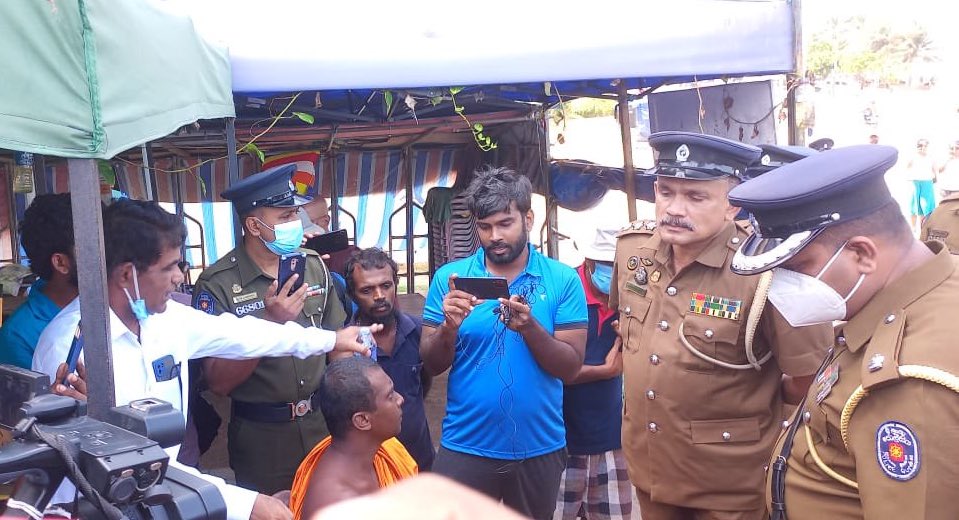Photo courtesy of Marisa de Silva
Despite widespread condemnation of the arrests, intimidation and harassment of peaceful protesters by the state, activists and journalists continued to be targeted for reprisals for their part in the aragalaya. The repressive emergency regulations that give the police the right to detain a person for up to 72 hours were unprecedented, National People’s Power MP Harini Amarasuriya told parliament, adding that even simple offences could mean imprisonment of 20 years or life.
“The appointment of Ranil Wickremesinghe as acting president and subsequently president has led to increased repression of protests, protesters and those supporting protests. The declaration of emergency sent a chilling political message of intolerance of dissent and this was followed by draconian emergency regulations that can severely restrict and violate freedom of expression, assembly, movement and lead to arbitrary arrests and prolonged detentions. The president’s decision to declare emergency has been now been ratified by parliament, indicating that both the executive and legislature are now on repressive path,” leading civil society members and organisations said in a statement.
“Time and time again Sri Lanka police fail to follow due process when arresting persons. The failure/refusal to reveal the whereabouts of the person can tantamount to an enforced disappearance,” tweeted human rights activist Ambika Satkunanathan. “When whereabouts aren’t known the person is vulnerable to rights violations including torture.”
Despite announcement by protesters at Galle Face that they would hand over the Presidential Secretariat by 2 pm on July 22, heavily armed military and police brutally attacked sleeping protesters to clear the site, destroying tents and damaging other property. Protesters, including those injured, were not allowed to leave the site for several hours. Ambulances, journalists, lawyers and religious leaders were prevented from going to Galle Face. Lawyers, journalists and those videoing and photographing were beaten and arrested.
Several protest sites outside Colombo were attacked and police forced other protest sites to disband.
“NPC calls on the government to protect the democratic right of protest of the people which is at the heart of democracy. Failure to do so could lead to the beginning of a new wave, (another meaning of the word Aragalaya), of protests with an uncertain conclusion,” warned the National Peace Council in a media statement, pointing out that it was the protest movement that had paved the way for a new president, prime minister and cabinet.
On 25, the Colombo Magistrate Court issued a travel ban on Father Jeewantha Peiris and several other human rights defenders involved in the protests. Two days later, Ratnapura police went to a local church looking to arrest Father Peiris.
On July 26, Dhaniz Ali, who was involved in protests at the Galle Face, was dragged off a plane that was about to leave by police officers after he had cleared immigration.
On July 27, Veranga Pushpika, an active protester at the Galle Face and journalist, was abducted from a bus in daylight by men in civilian clothes. Police later acknowledged his arrest but did not reveal his whereabouts to lawyers and the Human Rights Commission for several hours.
Also on July 27, four protesters who had handed over large amounts of money found at the President’s House to the police were arrested.
On the same day, people in civilian clothes claiming to be policemen visited the office of Xposure News, demanding that the security guard identify people in photographs and to see CCTV footage. Xposure News provided extensive coverage of the raid on Galle Face protest site and other incidents of violence.
A complaint was made by the Young Journalists Association to the Human Rights Commission about imminent arrest of investigative journalist and human rights defender Tharindu Uduweragedera, who has earlier been summoned for questioning by the Criminal Investigation Department.
The civil society statement condemned the ongoing attacks including violence, false labelling and legal reprisals against unarmed peaceful protesters by the government and called for an immediate end to retaliation against those exercising their constitutionally protected rights to advocate for change.
Pointing out that the protests began as a result of the severe economic crisis and the shortages of basic necessities with a clear link to government mismanagement and corruption, the statement said, “Hence, the protests, which have largely been peaceful, demand accountability and a change in the system of governance. The state response has been disproportionate use of force, threats, intimidation and legal reprisals against protesters and those believed to be leading or organizing the protests.”
“We especially condemn the labeling and mis- and disinformation against those the state portrays as ‘leading and organizing’ protests despite the fact the protests do not have leadership. Despite this civil society activists, pro-democracy campaigners, journalists, human rights lawyers, and clergy have been attacked, arrested and labeled as violent fascist elements by the state in an attempt to suppress dissent. The language used by the government enables a culture of violence and could escalate the on-going political crisis,” the statement said.
“Peaceful dissent is essential to sustaining democracy and, in context of the current crisis, international credibility. Strengthening political stability requires adherence to the rule of law and dialogue, not repression. The Sri Lankan state and the Wickremasinghe government must immediately cease the attacks on protesters and civic activists and those perpetrating violence against protestors should be held to account. Peaceful protest and defending human rights are not crimes. The government must remember and respect this,” the statement concluded.
